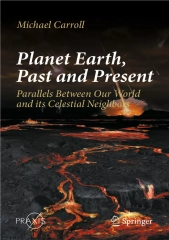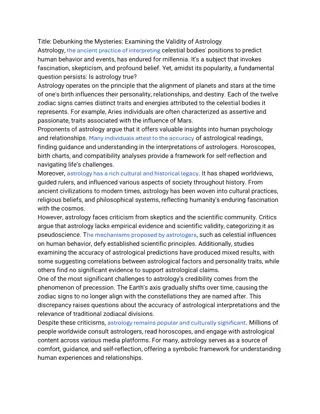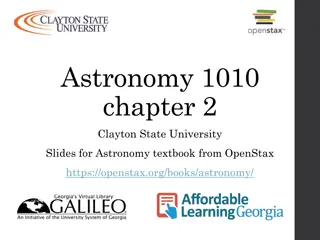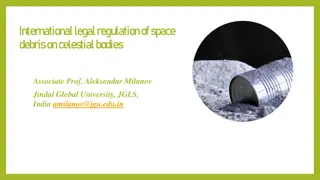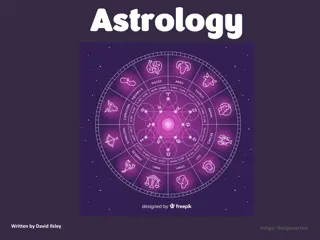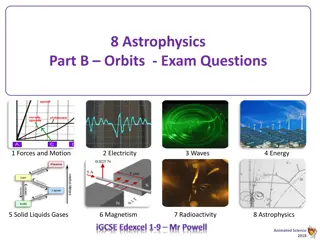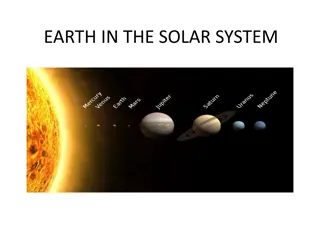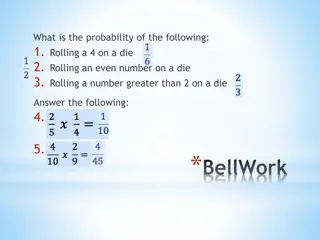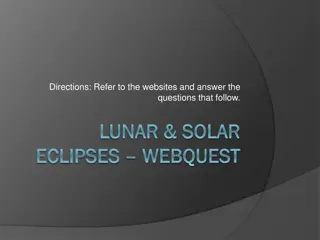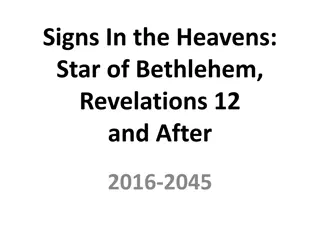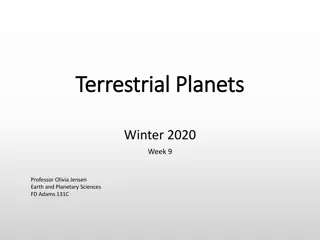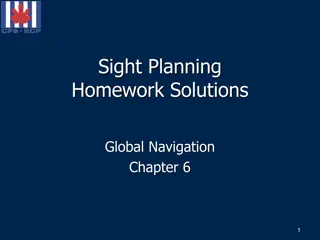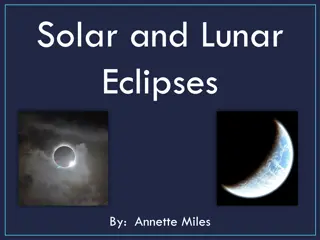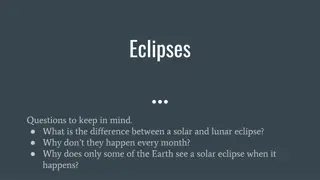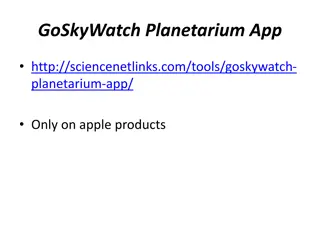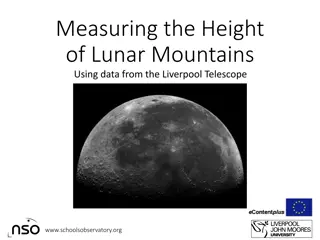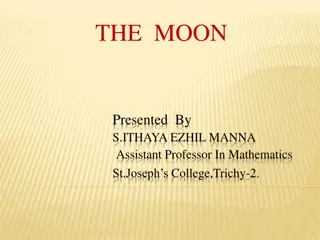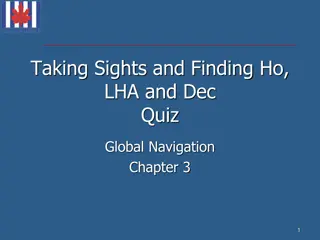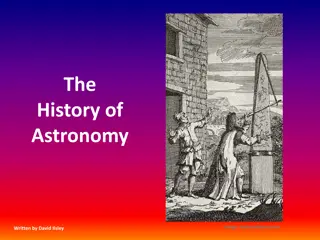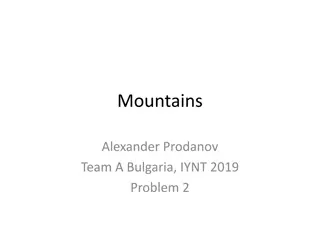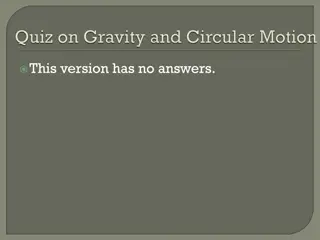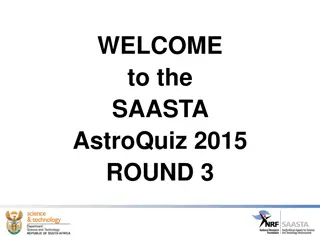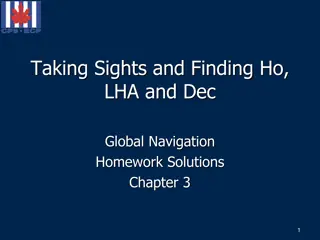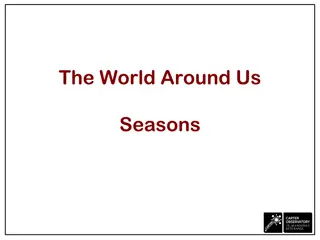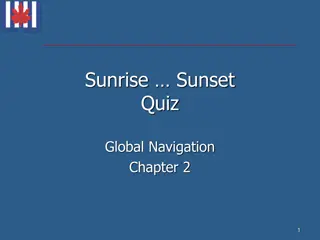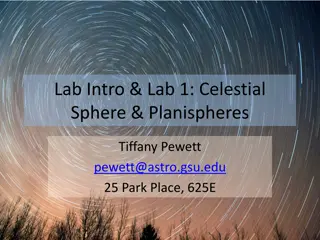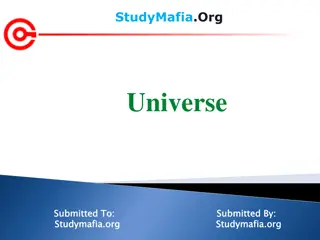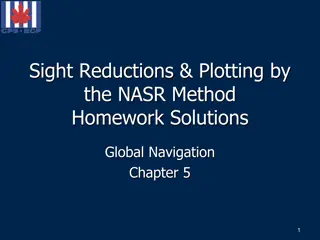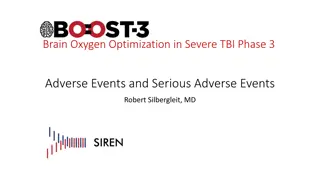PDF_⚡ Planet Earth, Past and Present: Parallels Between Our World and its Celest
\"COPY LINK HERE ; https:\/\/getpdf.readbooks.link\/3031413598\n\nget [PDF] Download Planet Earth, Past and Present: Parallels Between Our World and its Celestial Neighbors (Springer Praxis Books) | Planet Earth, Past and Present: Parallels Between Our World and its Celestial Neighbors (Springer Pra
0 views • 6 slides
Understanding Eclipses: The Celestial Dance Between the Sun, Moon, and Earth
Eclipses are fascinating astronomical events where the Moon comes between the Sun and Earth, causing either a solar eclipse or lunar eclipse. This summary delves into the different types of eclipses, such as total and partial solar eclipses, the Moon's elliptical orbit, and the intricate movements t
4 views • 25 slides
Understanding Adverse Events Following Immunization (AEFI)
Adverse Events Following Immunization (AEFI) are medical incidents that occur after immunization, potentially caused by the vaccine, leading to unfavorable symptoms. Pharmacovigilance plays a crucial role in detecting, assessing, and preventing these events. AEFI can impact immunization programs at
2 views • 40 slides
Hardware Demonstration and Improvements of the Stellar Positioning System
The Hardware Demonstration and Improvements of the Stellar Positioning System (SPS) involve utilizing ancient celestial navigation techniques for lunar exploration. SPS combines central-body-relative observation with star-field observation to determine absolute position, reducing mass/power impacts
5 views • 14 slides
its astrology true
Astrology links celestial bodies with events on Earth. It is often used to predict future events, understand personality traits, and provide guidance in decision-making. While some people swear by astrology and believe it to be a valuable tool, others dismiss it as pseudoscience with no basis in rea
15 views • 2 slides
Ancient Astronomy and Cosmologies Across Different Civilizations
Ancient civilizations like Babylonian, Assyrian, Egyptian, and Chinese had profound knowledge of astronomy, including tracking celestial events, developing calendars, and recording astronomical phenomena. The Greeks contributed to cosmology, contemplating the nature of the cosmos. Beliefs in a spher
2 views • 28 slides
International Legal Regulation of Space Debris and Celestial Bodies Concerns
Space debris on celestial bodies poses environmental risks and challenges in the context of economic resource exploitation. The Artemis Accords and the debate over space resource appropriation raise important legal and environmental issues that require international regulation to prevent degradation
0 views • 10 slides
The Evolution of Astrology: From Agricultural Significance to Cultural Importance
Humans discovered the agricultural implications of studying the stars post Ice Age, leading to improved harvests and settled communities. Astrologers interpreted celestial movements for predicting events, with planets playing a crucial role. Their perceived wisdom elevated their status in society, s
4 views • 25 slides
Understanding Orbits and Motion in Astrophysics
Explore the concept of orbits and motion in astrophysics, covering gravitational forces, planetary orbits, orbital speeds, and celestial phenomena like lunar eclipses. Delve into how objects move in space, the relationships between orbital speed, radius, and time period, and the dynamics of celestia
0 views • 14 slides
Understanding Celestial Bodies and Constellations in the Universe
Explore the fascinating world of celestial bodies in the universe, including stars, galaxies, planets, and constellations. Learn about the formation of stars, the structure of galaxies like the Milky Way, and how constellations have been observed and named throughout history. Discover the significan
0 views • 28 slides
Understanding Probability in Events
Explore concepts of probability in various events like rolling a die, compound events, simple events, and spinner probability. Learn how to calculate probabilities of different outcomes and understand the difference between single and compound events. Discover key principles in probability theory an
0 views • 13 slides
Understanding Lunar and Solar Eclipses: A Comprehensive Webquest
Delve into the intricacies of lunar and solar eclipses by exploring informative websites. Learn about lunar eclipse phases, types, and causes, sketch the Earth-Moon-Sun alignment, discover the reasons for eclipse frequency, and differentiate between the three lunar eclipse kinds. Unravel the mystery
0 views • 12 slides
Understanding Orbital Mechanics: Kepler's Laws, Center of Mass, and Equation of Motion
Exploring the fundamental concepts in orbital mechanics including Kepler's Laws, center of mass calculations, and equations of motion for celestial bodies. Topics covered include the laws of planetary motion, center of mass reference frame, and the concept of reduced mass in celestial mechanics.
0 views • 15 slides
Guide to Participating in STAR Events in Georgia FCCLA
Discover the significance of STAR Events in Georgia FCCLA, competitive events acknowledging proficiency in various projects, leadership, and career readiness. Learn how to select individual or team events, choose a suitable project, and initiate your project effectively. Empower yourself to excel in
0 views • 19 slides
Signs in the Heavens: The Revelation of the Sign of Yahushua and Biblical Astronomy
Explore the celestial phenomena and biblical interpretations from 2016 to 2045, including the Star of Bethlehem, Revelation 12 prophecy, and the significance of astronomical signs in understanding spiritual truths. Delve into the integration of non-Bible sources like the Book of Jasher and Book of E
0 views • 93 slides
Exploring Solar and Lunar Eclipses in Astronomy
Dive into the fascinating world of solar and lunar eclipses through vivid imagery and informative descriptions. Learn about the different types of eclipses, such as total and partial solar eclipses, as well as lunar eclipses caused by Earth's shadow. Discover the intricate dance between the Sun, Moo
0 views • 34 slides
Understanding Orbital Dynamics: Kepler's Laws and Newtonian Gravity
Delve into the fascinating world of orbital dynamics as we explore Kepler's Laws and Newtonian Gravity. From understanding the elliptical orbits of planets around the Sun to uncovering the role of gravity in shaping celestial motion, this journey will illuminate the fundamental principles governing
0 views • 18 slides
Celestial Navigation Chapter 6.1 Homework Solutions
Explore the challenges and solutions to celestial navigation through practical exercises involving star finders, celestial bodies identification, and sight planning tools. Enhance your knowledge of astronomy by setting up tools, locating planets and stars, and mastering the use of templates for plot
0 views • 22 slides
Understanding Solar and Lunar Eclipses
Solar and lunar eclipses are celestial phenomena where shadows are cast by one celestial body upon another. A solar eclipse occurs when the Moon blocks the view of the Sun during the new moon phase, while a lunar eclipse happens when the Earth's shadow falls on the Moon. This article explains the di
0 views • 38 slides
Understanding Eclipses: Solar and Lunar Phenomena Explained
Explore the difference between solar and lunar eclipses, why they don't occur every month, and why only some parts of Earth witness solar eclipses. Discover how the Moon's orbit and shadows play a crucial role in these celestial events.
0 views • 7 slides
Explore Space: Celestial Objects and Beyond
Dive into the wonders of the universe with this engaging lesson on space celestial objects. Discover the differences between comets and asteroids, explore planets and moons in our solar system, learn about stars, asteroids, comets, and galaxies, and unravel the mysteries of astronomy. Let your curio
0 views • 34 slides
Estimating Lunar Mountain Heights with Shadow Lengths
Explore how to estimate the height of lunar mountains by measuring the length of their shadows on the Moon's surface using data from the Liverpool Telescope. Discover the intriguing world of lunar shadows and how they can reveal information about celestial features. See how similar triangles and geo
0 views • 14 slides
The Moon: A Celestial Neighbor
The moon, Earth's closest celestial neighbor, orbits the Earth following Kepler's laws. With a distance of about 240,000 miles and a linear diameter of 2163 miles, the moon's mass is about 1/81 times that of Earth. Learn about the lunar orbit, nodes, and its relationship with synodic and sidereal mo
0 views • 11 slides
Global Navigation Quiz on Sights and Ho Corrections
Test your knowledge with this global navigation quiz focusing on parallax corrections for celestial bodies, GHA calculations, magnitude comparison, and more. Explore questions on lunar altitude corrections, sunrise sighting tips, and atmospheric corrections. Sharpen your celestial navigation skills
0 views • 11 slides
RMS PTO Board Meeting Update and Event Schedule
The recent RMS PTO board meeting covered various topics such as budget tracking, upcoming events, and recent activities. Discussions included PayPal usage, budget allocations for future fundraisers, expenses, and a review of recent events. The meeting also outlined an array of events planned for the
0 views • 7 slides
International Laws Regulating Military Activities in Outer Space
The legal advisor, Jean-François Mayence, presented a detailed overview of international regulatory laws concerning military activities in outer space at the International Conference in Bruges, Belgium. The presentation highlighted key treaties such as the 1967 Outer Space Treaty and the 1979 Agree
0 views • 8 slides
The History of Astronomy: From Ancient Wonder to Modern Science
Astronomy, the oldest science, has fascinated humanity for millennia. From early interpretations of celestial bodies as gods to the development of instruments in Mesopotamia to predict events like eclipses, the evolution of astronomy is rich and diverse. Aristotle's theories on the cosmos laid the f
0 views • 25 slides
Analyzing Tallest Mountains in the Solar System
This document explores the tallest mountains in the Solar System and proposes theoretical models for predicting their maximum altitudes on various celestial bodies. It discusses the heights of mountains on Mercury, Earth, Moon, Mars, Vesta, Ceres, Io, and other celestial bodies, along with different
0 views • 29 slides
Understanding Probability of Compound Events
Compound events involve multiple outcomes occurring together, such as independent events where one outcome does not affect another, and dependent events where one outcome affects the other. Complement sets, card probabilities, and mutually exclusive events are also discussed, providing a comprehensi
0 views • 15 slides
Concepts in Gravitational Forces and Celestial Bodies
This informative content delves into various concepts related to gravitational forces and interactions between celestial bodies like the Earth and the Moon. It covers topics such as the comparison of gravitational pulls, forces in concentric orbits, weight measurements in different scenarios, and th
0 views • 11 slides
SAASTA AstroQuiz 2015 Round 3 - Astronomy Trivia Questions
Test your astronomy knowledge with these 9 questions from the SAASTA AstroQuiz 2015 Round 3. Explore topics such as stars, planets, spacecraft missions, and celestial events. From Proxima Centauri to Blue Moons, challenge yourself with interesting facts about our universe.
0 views • 39 slides
Celestial Navigation Homework Solutions Chapter 3.1 - Taking Sights and Finding Ho, LHA, and Dec
Demonstrate and describe techniques for taking sights on moon, planets, and stars. Apply proper altitude corrections to determine Ho, compute LHA and Dec for each sextant observation, understand and apply celestial coordinates.
0 views • 16 slides
Understanding Earth's Seasons and Yearly Cycles
Seasons on Earth are a result of its tilt and orbit around the Sun, leading to changes in temperature and daylight throughout the year. Learn about the characteristics of each season, how Earth's tilt affects sunlight distribution, and the annual events that signal seasonal shifts. Explore the signi
0 views • 8 slides
Noise Control Measures and Community Preferences at the Corn Exchange
Various images and references discuss the history of amplified music events at the Corn Exchange, noise complaints leading to control methods by the FTC, impacts on events and community preferences post-control, and survey findings on participant demographics, noise effects, and desired public event
0 views • 19 slides
Global Navigation: Sunrise Sunset Quiz Chapter 2.1 Solutions
In this chapter, the solutions to various navigation problems related to sunrise, sunset, time zones, and celestial calculations are discussed. The solutions cover scenarios such as determining ZT based on given LMT and coordinates, calculating morning NT, finding ZT for morning CT, and understandin
0 views • 10 slides
Astronomy Lab Information and Schedule
In this astronomy lab course, students will explore various topics related to celestial objects, constellations, planispheres, and observational projects. The labs involve practical activities such as observing the phases of the Moon, visiting observatories, and understanding celestial coordinates.
1 views • 12 slides
Understanding the Universe: An Exploration of Celestial Bodies
Scientists study the vast expanse of the universe, birthed from the Big Bang, where stars, galaxies, and constellations exist. Exploring celestial bodies like stars, planets, and moons reveals the wonders of our universe.
0 views • 20 slides
Celestial Navigation: NASR Method Homework Solutions
Calculate altitudes, intercepts, and azimuths of celestial bodies using the NASR method. Plot celestial lines of position (LOPs) and fixes based on sights taken on the sun, moon, planets, or stars. Explore comparisons between the Law of Cosines and NASR methods for sight reduction. Practice plotting
0 views • 5 slides
Brain Oxygen Optimization in Severe TBI: Adverse Events Analysis
This study led by Dr. Robert Silbergleit focuses on adverse events in brain oxygen optimization for severe Traumatic Brain Injury (TBI) patients. It outlines key points for reporting adverse events, discusses relatedness algorithms, and presents scenarios to analyze adverse events occurrence post-en
0 views • 24 slides
Official Kayaking Rules for Michigan Events
Official rules for kayaking events in Michigan including information on events offered, uniforms, equipment requirements, and general rules for athletes. Athletes can enter up to three events but must choose between Traditional or Unified events. The rules cover attire, required equipment such as li
0 views • 14 slides
